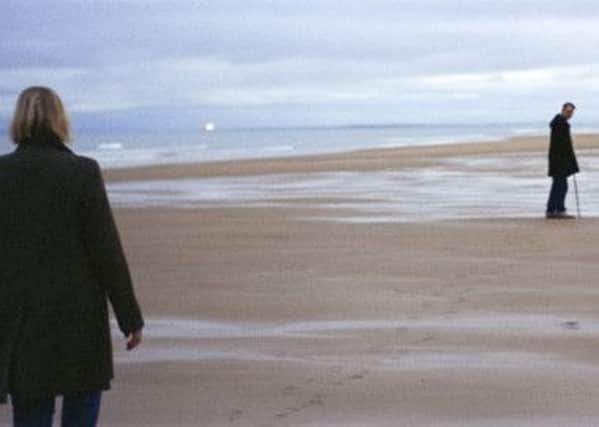Film reviews: The Possibilities Are Endless


The Possibilities Are Endless (12A)
Directors: Edward Lovelace and James Hall
Running time: 83 minutes
***
Filmmakers Edward Lovelace and James Hall try to recreate Collins’ initial post-stroke confusion at the start of the film, with a fussy, impressionistic mash-up of voices, images and sound design. You can’t fault the intentions but the effect is more like Terrence Malick on a bad day, and it’s quite a relief when the self-conscious imagery settles down and gives way to something less ambitious but also more comprehensible.
Instead of retirement, Collins chose a rigorous regimen of physical rehabilitation to reclaim motor skills, memory and language. Initially the musician’s ability to communicate was limited to a few phrases. He could say “yes”, “no” and “the possibilities are endless”.
Advertisement
Hide AdThe other phrase he clung to was “Grace Maxwell”, the name of his longtime professional and personal partner. At one point Maxwell, a likeable, bullish blonde, admits that her husband is a changed man; apparently he’s now sunnier and more optimistic than he was before his illness, yet he’s also more reliant on his wife, fussing theatrically when Maxwell clips his fingernails a little too neatly in one sequence.
When the couple reminisce about the origins of their relationship, the co-directors float a staged minidrama where a young man (played by Collins’ son, William) meets and silently flirts with a woman (Yasmin Paige) in a chippy. Again, this seems pretty redundant, not to mention a rather romanticised portrait of a down-to-earth pair who seem to relish banter rather than pantomime.
By contrast, Collins’ interplay with Maxwell often speaks volumes; at one point they take a stroll together, teasing, bickering and laughing companionably, while the camera records Collins’ physical difficulties and Maxwell’s controlled watchfulness. As a portrait of determination and devotion, their relationship is very affecting.
Now paralysed on his right side, Collins can play the guitar only if someone strums the strings while he changes the chords with his left hand. Once a keen artist, he has, astonishingly, retrained himself to draw with his left hand. He has also come back to composing and recording, singing candidly about his near death experience and triumphant return.
It’s commendable that the co-directors of The Possibilities Are Endless are so keen to eschew the usual trappings of music documentaries, such as the famous talking heads, shots of gold albums on the wall and dips into the video archive of greatest hits. On the other hand, the noodling is exasperating, especially since it comes at the expense of real insight. BBC Scotland’s documentary Home Again, made with Collins a few years earlier, is more candid and comprehensive. Sometimes, although the possibilities of a documentary may be endless, it’s better to embrace simplicity.
The Skeleton Twins (15)
***
Bridesmaids’ Kristen Wiig and Superbad’s Bill Hader as twins? There’s about a foot difference in height between them, for starters. In fact, there hasn’t been a more mismatched pair of movie siblings since Arnold Schwarzenegger and Danny Devito.
Advertisement
Hide AdThis is not the only quibble you might have with The Skeleton Twins, a drama with many mood swings where siblings who haven’t spoken to each other in
a decade are brought back together by a moment of synchronicity: Milo (Hader) attempts suicide, interrupting Maggie (Wiig) just as she is contemplating a large handful of pills herself.
Advertisement
Hide AdMaggie and Milo are linked by lousy parenting and disappointing lives. He’s a gay, underemployed actor living alone in LA, so Maggie brings him back to the upstate New York home she shares
with her straight-arrow, nice-guy bore of a husband (Luke Wilson, very good).
Director Craig Johnson and his co-writer Mark Heyman (Black Swan) have a slightly wearing predilection for explicatory dialogue (“god, what the hell happened to us?”) and emotional confrontations, yet The Skeleton Twins can be very funny. A scene where Milo tries to pull Maggie out of a sulk with a goofy lipsync to Starship’s power ballad Nothing’s Gonna Stop Us Now is a particular highlight.
On general release from Friday
Say When (15)
***
Keira Knightley straps on an American accent instead of a corset to play Megan, a twentysomething slacker who opts to take a holiday from the grown-up decision of whether to marry her high school sweetheart (Mark Webber) by hiding out at the house of teenage Annika (Chloe Grace Moretz). How implausible and creepy does this sound as a plot premise? It gets even more awkward when Megan finds herself attracted to Annika’s dad (Sam Rockwell), who is clearly cool (great hair, and a Rockwellish line in sarcasm) but also an adult (wears glasses when doing paperwork). Humpday’s Lynn Shelton directs a movie that seems to have been styled like an alcopop: crude, artificially flavoured and hard to swallow if sober.
On general release from Friday
November Man (15)
**
Roger Donaldson directs a spy potboiler with CIA man Pierce Brosnan lured out of retirement to escort an important witness (Quantum Of Solace’s Olga Kurylenko) out of Moscow before the Russians find her. Confusingly blending both hi-tech drones, and ancient flip-top phones, it’s nice to see Brosnan back driving fast cars and shooting henchmen, but ploughing through this tedious by-the-numbers thriller is less Bond, more of a bind.
On general release from Friday
Set Fire To The Stars (15)
***
Elijah Wood stars as a young American academic tasked with taking his literary hero Dylan Thomas (Celyn Jones) on a tour of the States. Shot in expressionist monochrome with a hep jazz score, it’s the sort of film where someone says, “How much trouble can one man be?” then cuts to Thomas carousing with a woman on a wild night out. Told in episodic narrative bursts, it is fitfully engaging and rousingly acted.
On general release from Friday